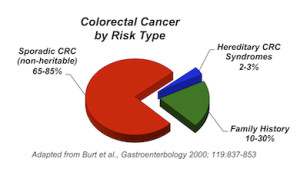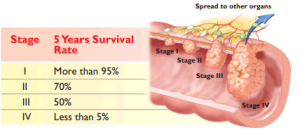Part II Treatment & Care
Many colon cancer treatment options are available for colorectal cancer, including surgery, chemotherapy, and radiation. Here’s what to expect from each type of treatment and tips for recovery.
Polyp Removal and Other Precancerous Conditions
Precancerous conditions of the colon or rectum are changes to cells that make them more likely to develop into cancer. These conditions are not yet cancer, but there is a higher chance these abnormal changes will become colorectal cancer.
The most common precancerous conditions of the colon or rectum area:
–adenomas
–hereditary colorectal syndromes
If you have a precancerous condition, you will likely have regular follow-up and screening tests to find cancer as early as possible if it develops. Some precancerous conditions can be treated with surgery to help reduce the risk that they will become cancer.
Colorectal Cancer Treatment
Stages of the cancer with TNM system for colorectal cancer helps determine the RX.
The most commonly used colorectal cancer staging system is known as the TNM system, which has been established by the American Joint Committee on Cancer. The TNM staging system looks at three key factors to determine the stage of cancer:
- Tumor (T) looks at how far the primary tumor has grown into the wall of the colon or rectum, and if it has expanded into nearby areas.
- Lymph node (N) examines the extent of the cancer spread to nearby lymph nodes.
- Metastasis (M) refers to whether cancer has spread to other parts of the body, such as the liver, lungs or brain.
A number (0-4 stages) or the letter X is assigned to each factor. Using this colorectal cancer staging system, a higher number indicates increasing severity. For instance, a T1 score indicates a smaller tumor than a T2 score. The letter X means the information could not be assessed.
Stages of colorectal cancer diagnosis occurs in conjunction with the following TNM categories:
- T1-T2: If the cancer has grown through the muscularis mucosa and into the submucosa, it is considered T1. Or, if the cancer has grown into the muscularis propria, then it is classified as T2.
- N0: The cancer has not spread to the lymph nodes.
- M0: There has been no spreading to organs or other nearby areas
- Stage I colorectal cancer treatments
Once the T, N and M scores have been assigned, an overall stage is determined, and thus treatment options can be explored.
Here’s a quick rundown of the options available for colorectal cancer treatment from surgery to cutting-edge biologic therapy.
Colorectal Cancer: Treatment by Stages
STAGE 0 (IN SITU) Colorectal Cancer Treatment
Surgery for colon cancer
- Polypectomy: snaring and removing polyps containing cancer during a colonoscopy.
- Local excision: removal of flat colon growths “piecemeal” during colonoscopy.
- Open abdominal surgery to remove cancer, part of colon, and nearby lymph nodes in high risk situations where:
- There is a spread to polyp stalk
- There is spread to lymphatic vessels (not lymph nodes)
- Cells look very abnormal under the microscope (high grade)
- Surgical margins (edge of tissue) contain cancer cells or can’t be evaluated or contain cancer cells.
- Local excision would be too time-consuming or difficult to perform.
Chemotherapy
Chemotherapy is not recommended for stage 0 colon cancer.
Stage I Colorectal Cancer Treatment
Surgery
Colectomy (resection): Abdominal surgery to remove the section of colon where the tumor is located, tissue containing blood and lymph vessels surrounding the colon (mesentery), healthy tissue margins on either side, and at least 12 lymph nodes, if possible. Then the remaining ends of colon are reconnected with sutures or staples. This connection is called an anastomosis.
Open colectomy: An incision is made in the abdomen, surgery performed through the opening, and the incision closed with sutures and/or staples.
Laparoscopic colectomy: Three small keyhole incisions are made to insert a lighted instrument and specially designed surgical instruments that can be manipulated within the abdomen. Sometimes an incision is made just long enough for the surgeon’s hand to assist during laparoscopy.
Chemotherapy
Chemotherapy is not recommended for stage I colon cancer.
Part III on continuation of treatments of other stages of this condition (Stage II & III)

